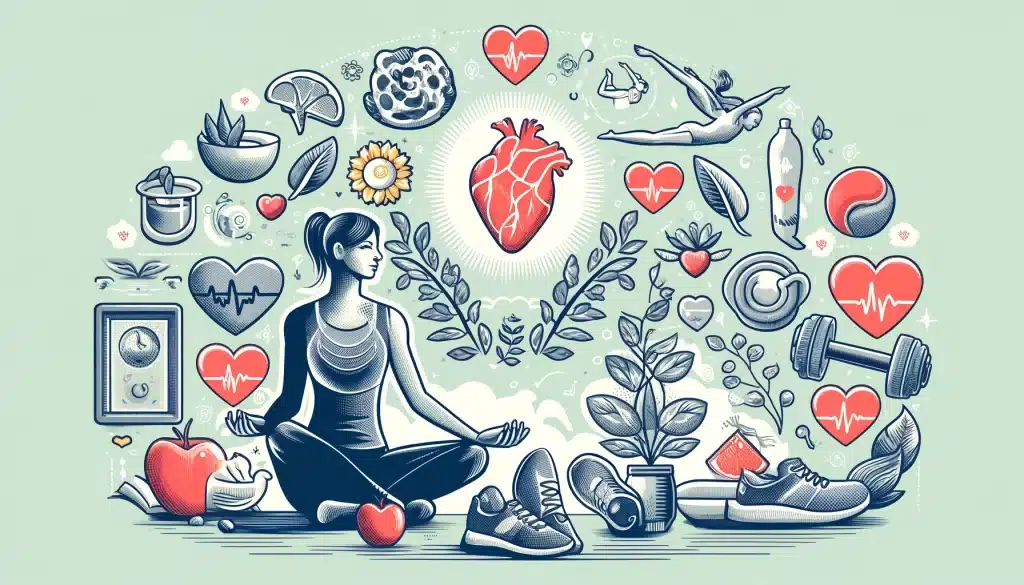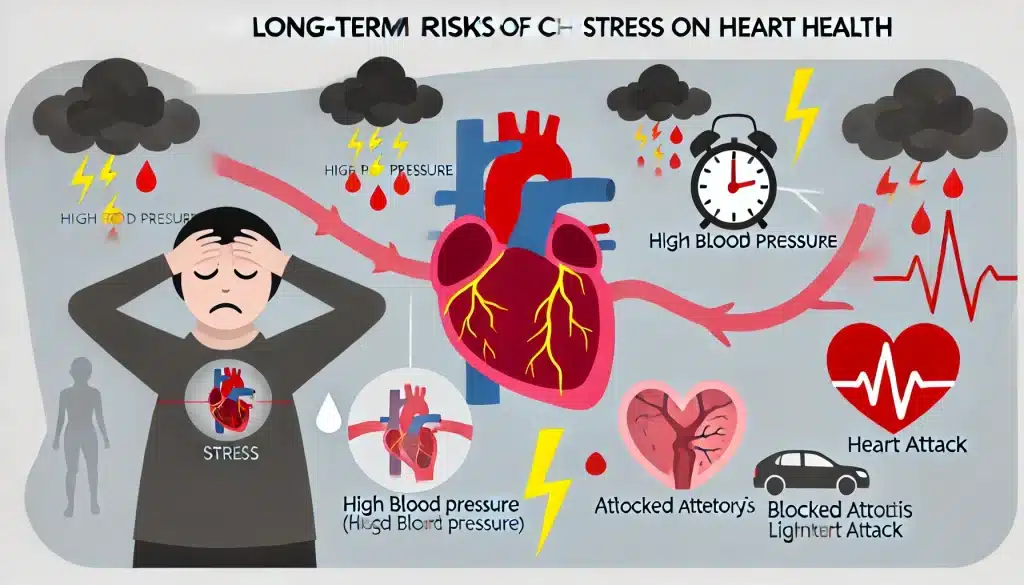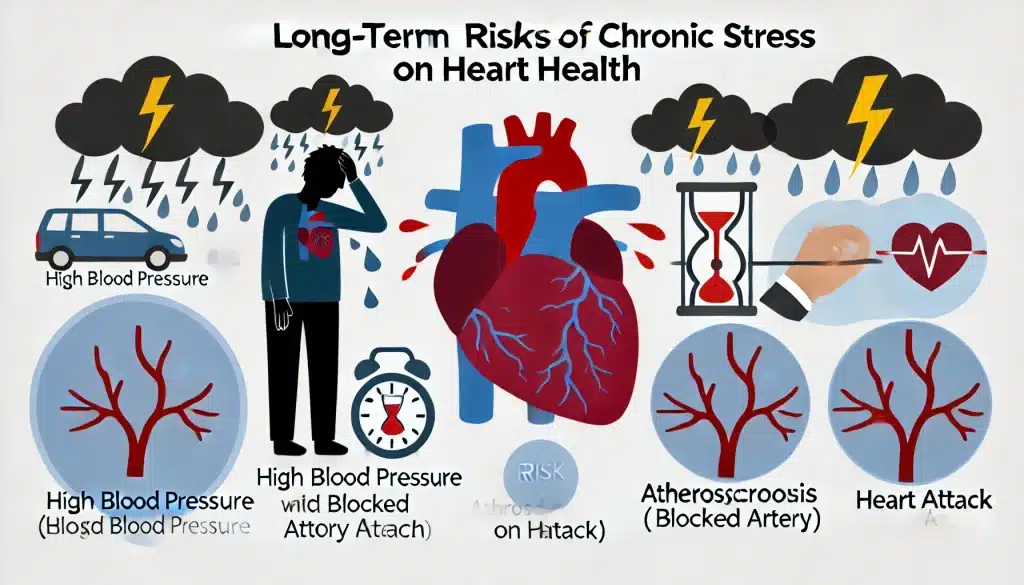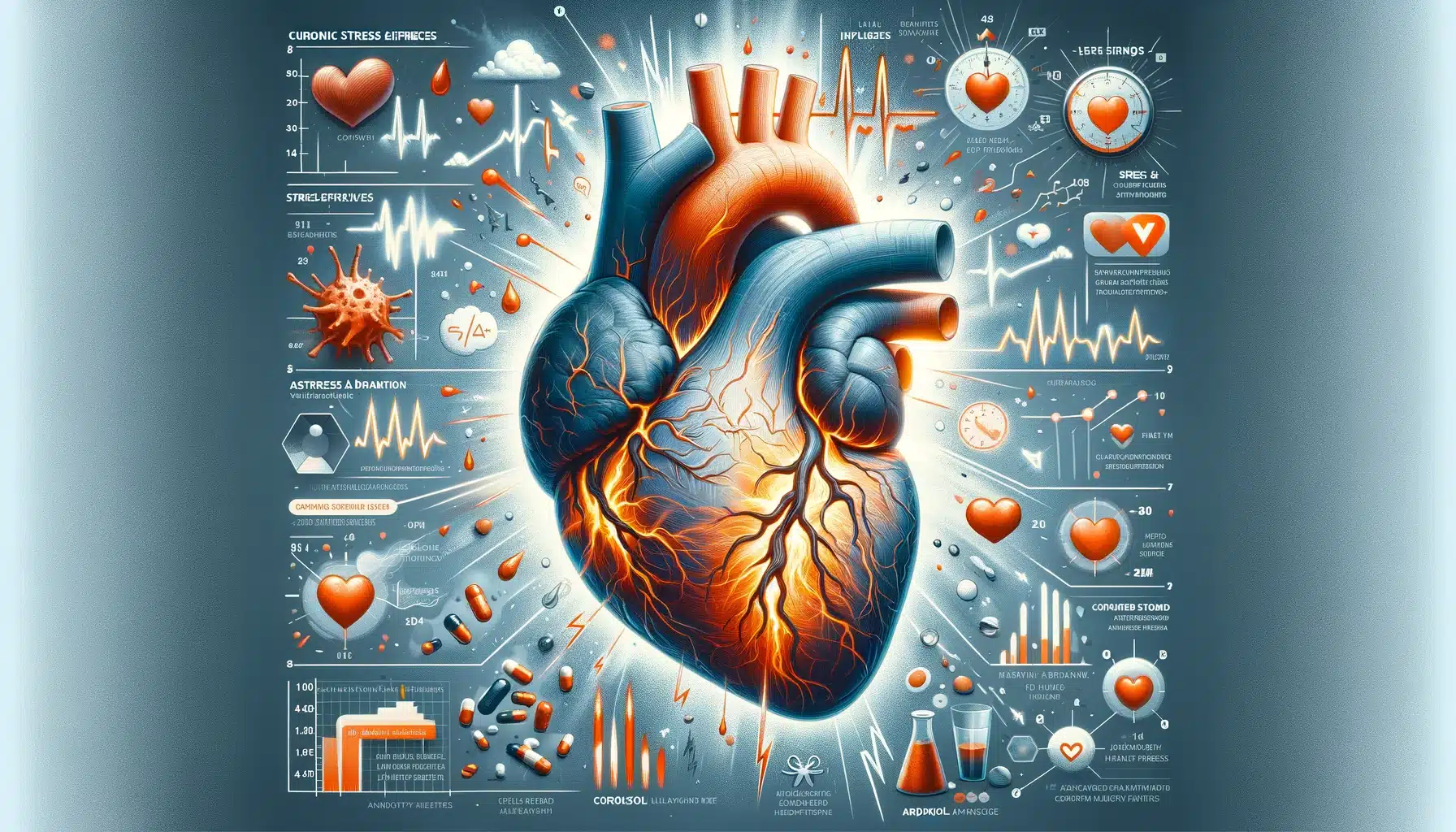Understanding Chronic Stress
Chronic stress is a prolonged and constant feeling of stress that can negatively affect your health if left unmanaged. Unlike acute stress, which is a response to a short-term threat, chronic stress persists over a long period and can be caused by factors such as ongoing financial problems, work-related issues, or chronic illness.
While stress is a natural response of the body to perceived threats, chronic stress keeps your body in a constant state of alert, leading to numerous health issues, including those affecting the heart.
- Chronic stress can cause persistent elevated heart rates.
- It triggers a continuous release of stress hormones like cortisol and adrenaline.
- It can contribute to high blood pressure and inflammation.
The Connection Between Stress and Heart Health
Stress and heart health are closely linked. When you experience stress, your body goes into “fight or flight” mode, releasing stress hormones that prepare you to deal with the perceived threat. While this response can be helpful in short bursts, chronic stress keeps your body in this heightened state, which can lead to negative effects on your cardiovascular system.
How Stress Affects the Heart
Chronic stress can cause a range of cardiovascular issues, including increased heart rate and blood pressure. Over time, these effects can damage your arteries, contributing to the buildup of plaque, which narrows the arteries and increases the risk of heart attack and stroke. Stress can also trigger inflammation in the body, further complicating heart health.
Impact on Blood Pressure
One of the most immediate impacts of chronic stress on the heart is elevated blood pressure. High blood pressure forces the heart to work harder, which can weaken the heart muscle over time. Additionally, it increases the risk of heart attack, stroke, and other cardiovascular complications.
Stress-Induced Behavioral Changes
In addition to the direct physiological effects, stress often leads to unhealthy behaviors that further harm heart health. These behaviors can include overeating, smoking, excessive alcohol consumption, and lack of physical activity. These lifestyle choices can compound the negative effects of stress on the heart, creating a vicious cycle that can be difficult to break.

Physiological Effects of Chronic Stress on the Heart
Chronic stress can have profound physiological effects on the heart. These effects are not limited to the direct impact of stress hormones but also include changes in heart function and structure over time.
Increased Heart Rate and Palpitations
Stress activates the body’s sympathetic nervous system, leading to an increased heart rate. While this response is useful in short-term situations, chronic activation can result in palpitations, a persistent feeling of your heart pounding or racing. These palpitations can be uncomfortable and signal underlying stress-related heart issues.
Impact on Heart Muscle and Blood Vessels
- Cardiomyopathy: Chronic stress can lead to stress-induced cardiomyopathy, a condition where the heart muscle weakens and struggles to pump blood effectively.
- Vascular Damage: Prolonged exposure to stress hormones can damage the lining of blood vessels, increasing the risk of atherosclerosis (hardening of the arteries).
- Increased Risk of Blood Clots: Stress can also increase the likelihood of blood clot formation, which can lead to serious events such as heart attacks and strokes.
Hormonal Impact and Inflammation
The hormones released during stress, particularly cortisol and adrenaline, contribute significantly to heart problems. These hormones cause inflammation, which plays a crucial role in heart disease.
- Cortisol: High levels of cortisol can lead to increased cholesterol, triglycerides, and blood sugar, all of which are risk factors for heart disease.
- Adrenaline: Adrenaline raises heart rate and blood pressure, adding extra strain on the heart and blood vessels.
Common Symptoms of Stress-Induced Heart Problems
Chronic stress can manifest in various symptoms that may indicate underlying heart problems. Recognizing these symptoms early can help in seeking timely medical intervention and reducing the risk of severe heart conditions.

Physical Symptoms
- Chest Pain: Often described as tightness or pressure, chest pain is a common symptom of stress-related heart issues. It can be mistaken for a heart attack, making it essential to seek medical advice if this symptom occurs frequently.
- Shortness of Breath: Stress can cause difficulty in breathing or the feeling that you cannot get enough air, which is particularly concerning when it happens during rest or minimal activity.
- Fatigue: Chronic stress depletes your energy levels, leading to constant tiredness and fatigue, even with sufficient rest.
Mental and Emotional Symptoms
- Anxiety: Persistent worry and fear, often disproportionate to the situation, can signal stress-induced heart problems.
- Depression: Chronic stress can lead to feelings of hopelessness, loss of interest in activities, and prolonged sadness, which are linked to poor heart health.
- Sleep Disturbances: Stress often disrupts normal sleep patterns, leading to insomnia or poor-quality sleep, further affecting heart health.
Behavioral Changes
In addition to physical and emotional symptoms, stress can lead to changes in behavior that negatively impact heart health.
- Poor Diet: Stress can lead to unhealthy eating habits, such as overeating or consuming high-fat, high-sugar foods, which contribute to heart disease.
- Reduced Physical Activity: Feeling stressed can decrease motivation to exercise, reducing cardiovascular fitness and increasing the risk of heart problems.
- Increased Use of Alcohol and Tobacco: Some people turn to alcohol or smoking as a way to cope with stress, which directly harms heart health.

Long-Term Risks of Chronic Stress on Heart Health
Over time, chronic stress can significantly increase the risk of developing serious heart conditions. Understanding these risks can help emphasize the importance of managing stress effectively.
Coronary Artery Disease
Chronic stress contributes to the development of coronary artery disease (CAD), a condition where the coronary arteries that supply blood to the heart muscle become narrowed or blocked. This is often due to the buildup of plaque, a process accelerated by stress-related inflammation and high blood pressure.
Heart Attack and Stroke
- Heart Attack: Prolonged stress can lead to conditions that increase the risk of a heart attack, such as high blood pressure and elevated cholesterol levels. Stress can also trigger a heart attack in individuals with preexisting heart conditions.
- Stroke: The stress response can lead to the formation of blood clots, which can block blood flow to the brain, resulting in a stroke. Stress also increases the risk factors associated with stroke, such as hypertension.
Heart Failure
Heart failure occurs when the heart cannot pump enough blood to meet the body’s needs. Chronic stress can weaken the heart muscle over time, making it less efficient at pumping blood. This condition can lead to a chronic, debilitating state that significantly reduces quality of life.
Arrhythmias
- Irregular Heartbeats: Chronic stress can cause arrhythmias, which are irregular heartbeats. These can range from harmless to potentially life-threatening conditions, such as atrial fibrillation.
- Increased Heart Rate: Persistent stress keeps the heart rate elevated, which over time can lead to damage and dysfunction of the heart muscle.
High Blood Pressure and Hypertension
One of the most common long-term risks of chronic stress is high blood pressure, a major risk factor for heart disease. Hypertension can damage blood vessels, increase the heart’s workload, and ultimately lead to heart attacks, strokes, and heart failure.
How to Manage Stress for Better Heart Health
Managing stress is crucial for maintaining heart health. There are various strategies and lifestyle changes that can help reduce stress levels and protect your heart from the harmful effects of chronic stress.
Healthy Lifestyle Choices
- Regular Exercise: Physical activity is a natural stress reliever. It helps release endorphins, which are chemicals in the brain that act as natural painkillers and mood elevators. Regular exercise also strengthens the heart and improves circulation.
- Balanced Diet: Eating a healthy diet rich in fruits, vegetables, whole grains, and lean proteins can help reduce stress. Avoiding excessive caffeine, sugar, and alcohol can also stabilize mood and energy levels.
- Quality Sleep: Getting enough sleep is essential for stress management. Poor sleep can worsen stress, and chronic stress can negatively affect sleep quality, creating a vicious cycle. Aim for 7-9 hours of sleep per night.
Mindfulness and Relaxation Techniques
- Meditation: Practicing meditation can help you focus on the present and reduce stress. Techniques like deep breathing, progressive muscle relaxation, and guided imagery can lower heart rate and blood pressure.
- Yoga and Tai Chi: These practices combine physical movement, breathing exercises, and meditation, which can be highly effective in reducing stress and improving heart health.
- Mindfulness: Mindfulness involves staying in the moment and accepting it without judgment. Regular practice can reduce stress, improve sleep, and enhance overall well-being.
Social Support and Connections
Connecting with others is a powerful way to manage stress. Building strong relationships and having a support network can provide emotional comfort and practical assistance in times of stress.
- Talk to Friends and Family: Sharing your thoughts and feelings with trusted friends or family members can help alleviate stress and offer a different perspective on problems.
- Join a Support Group: Support groups provide a safe space to discuss your experiences and hear from others who may be dealing with similar issues, which can be comforting and motivating.
Time Management and Prioritization
Poor time management can lead to stress and overwhelm. Learning to prioritize tasks, delegate when possible, and set realistic goals can help you manage your responsibilities more effectively and reduce stress.
- Set Boundaries: Learn to say no when necessary and set boundaries to protect your time and energy.
- Plan and Organize: Use tools like planners or digital apps to keep track of your tasks and schedule, making it easier to manage your time and reduce last-minute stress.
Practical Tips to Reduce Stress
Reducing stress involves both short-term strategies to manage immediate stressors and long-term changes to prevent stress from becoming chronic. Here are practical tips that can help you manage stress effectively.
Immediate Stress Relief Techniques
- Deep Breathing: Engage in deep breathing exercises, such as inhaling slowly through your nose, holding for a few seconds, and exhaling through your mouth. This technique can help calm the mind and reduce the physical effects of stress.
- Take a Break: Step away from the stressful situation for a few minutes. Whether it’s a short walk, listening to music, or simply closing your eyes and taking a few moments to relax, taking a break can help reset your stress levels.
- Progressive Muscle Relaxation: This involves tensing and then slowly releasing each muscle group in your body. It can help reduce physical tension associated with stress.

Long-Term Stress Management Strategies
- Develop a Routine: Having a consistent daily routine can provide a sense of stability and predictability, which helps in managing stress. Include time for relaxation and activities you enjoy.
- Set Realistic Goals: Break down large tasks into manageable steps and set achievable goals. This approach can reduce the feeling of being overwhelmed and help you stay focused.
- Limit Screen Time: Reduce the amount of time spent on screens, especially before bedtime. Excessive screen time can increase stress levels and interfere with sleep.
Engage in Enjoyable Activities
Participating in activities that you find enjoyable can be a great way to reduce stress. Whether it’s a hobby, sport, or creative endeavor, doing something that makes you happy can provide a positive outlet for stress.
- Hobbies: Engage in hobbies like gardening, painting, reading, or playing a musical instrument. These activities can provide a mental escape and help you relax.
- Physical Activities: Whether it’s dancing, hiking, or playing a sport, physical activity not only improves physical health but also boosts mood and reduces stress.
Maintain a Positive Outlook
Maintaining a positive outlook on life can help buffer the effects of stress. While it’s not always possible to avoid stressful situations, focusing on the positives and practicing gratitude can help you handle stress better.
- Practice Gratitude: Take a few minutes each day to reflect on what you’re grateful for. This practice can shift your focus away from stressors and towards positive aspects of your life.
- Positive Self-Talk: Challenge negative thoughts and replace them with more positive, constructive ones. Encouraging yourself and focusing on your strengths can improve your resilience to stress.

When to Seek Professional Help
While managing stress with self-help strategies can be effective, there are times when professional help may be necessary. Recognizing when to seek support is crucial for preventing chronic stress from causing severe health issues, including heart problems.
Signs You Need Professional Help
- Persistent Physical Symptoms: If you experience ongoing symptoms such as chest pain, palpitations, or shortness of breath that do not improve with stress management techniques, it’s important to consult a healthcare professional.
- Unmanageable Anxiety or Depression: When stress leads to severe anxiety, depression, or panic attacks that interfere with daily life, professional help can provide the necessary support and treatment.
- Impact on Daily Functioning: If stress is affecting your ability to work, maintain relationships, or carry out daily tasks, seeking help from a therapist, counselor, or doctor can help you develop coping strategies and address underlying issues.
Types of Professional Help
- Therapists and Counselors: Mental health professionals, such as psychologists and licensed counselors, can help you explore the sources of your stress and develop coping mechanisms. They may use techniques such as cognitive-behavioral therapy (CBT) to change negative thought patterns.
- Medical Professionals: Doctors can assess physical symptoms related to stress, provide medication if necessary, and refer you to specialists, such as cardiologists, if there are concerns about heart health.
- Support Groups: Joining a support group allows you to connect with others who are experiencing similar stress-related challenges. Sharing experiences and learning from others can be a valuable part of managing stress.
Benefits of Professional Help
Seeking professional help can provide tailored strategies to manage stress effectively. Professionals can offer a safe space to discuss your feelings, validate your experiences, and provide tools that are specific to your situation.
- Personalized Stress Management Plans: Therapists can help create a personalized plan that includes stress-reduction techniques, lifestyle changes, and coping strategies that work best for you.
- Medical Interventions: In some cases, medication may be necessary to manage symptoms of anxiety or depression. Doctors can prescribe appropriate treatments and monitor their effectiveness.
- Long-Term Support: Regular sessions with a professional can provide ongoing support, helping you navigate life’s stressors and maintain heart health over time.
Frequently Asked Questions
What are the early signs of stress affecting heart health?
Early signs of stress affecting heart health can include symptoms such as chest pain, rapid heartbeat, shortness of breath, and fatigue. Additionally, stress may lead to behavioral changes like increased alcohol or tobacco use, overeating, and a lack of physical activity, which can further harm heart health.
Can stress alone cause a heart attack?
While stress alone may not directly cause a heart attack, it can significantly increase the risk by contributing to high blood pressure, inflammation, and unhealthy behaviors. In people with preexisting heart conditions, stress can trigger a heart attack by increasing the heart’s workload and causing changes in heart rate and blood pressure.
How can I quickly reduce stress during a stressful situation?
To quickly reduce stress in a stressful situation, try deep breathing exercises, progressive muscle relaxation, or taking a short break to step away from the stressor. These techniques can help calm your mind and body, providing immediate relief from acute stress.
What lifestyle changes can improve heart health and reduce stress?
Key lifestyle changes that can improve heart health and reduce stress include regular physical activity, a balanced diet rich in fruits and vegetables, adequate sleep, and practicing relaxation techniques like meditation or yoga. Reducing screen time, setting realistic goals, and building a strong social support network are also beneficial.
When should I see a doctor about stress and heart health?
You should see a doctor if you experience persistent symptoms such as chest pain, palpitations, severe anxiety, or if stress is significantly impacting your daily life. Early intervention can help prevent serious complications and improve both mental and heart health.


